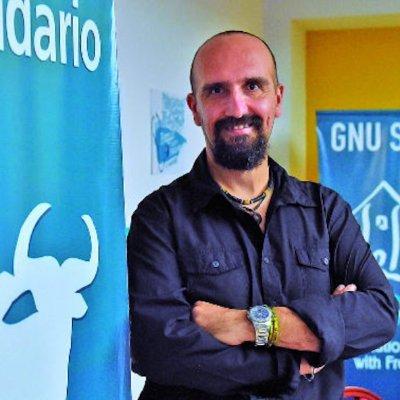
Dr Luis Falcon is a medical doctor and computer scientist. He combines these skills to work on GNU Health to bring free software / open source to the healthcare sector. He spoke with us about progress, ongoing problems and an upcoming event.
OSOR (Ciarán O'Riordan): You're working on free software / open source for the health sector. Is the health sector lagging behind?
Dr Falcon: We are far from having Libre Software in the public administration in general, and in the health care sector in particular. Free / Libre software projects like Orthanc or GNUHealth are successful around the world. They embrace open science, adopt industry standards and are deployed in many public health institutions.
OSOR: GNU Health is used in South America, Africa and Asia. What would be needed for GNU Health to gain adoption in Europe?
Dr Falcon: We are starting to have projects in Europe. For instance, in Valencia, GNU Health is being used by an institution focused on providing housing and support to mental health patients. They'll be talking about it at GHCon 2022.
But, the way the administrations are set up, it makes it easier for the large corporations to reach the decision makers and access funding. For example, our government recently gave over €130 million to the Bill and Melinda Gates foundation to fight Malaria, Tuberculosis and AIDS. We've been doing that for over 15 years, with open science and free software like GNU Health. Yet, we are invisible.
To improve the situation, first of all, let's remove the bureaucratic barriers.
Second, a successful pilot project would show the benefits of projects like GNU Health in the European public health system. We can work at local, regional or national scale, in any country from the EU that is willing to take the challenge, and by the end of the project, the city/province/country will have a full-blown Libre federated health network and ecosystem, including Hospital Management, Radiology, Laboratory and Personal Health for their professionals and individuals.
And third, we need to share the message and spread the word about the benefits of Free/Libre Software in the public administration, including the health care system. We need to talk to politicians and health care providers about the importance of Libre Software in the healthcare system.
The GNU health community and GNU Solidario are working side-by-side with our colleagues from the Free Software Foundation Europe (FSFE) to help the European Union adopt Libre Software. One great campaign is Public Money, Public Code.
OSOR: On the software side, what is GNU Health today?
Dr Falcon: GNUHealth is a Libre digital health ecosystem. It provides institutions, health professionals and individuals with tools to improve their health and quality of life, from the socio-economic determinants of health, to the molecular basis of disease. The software components provide:
- Hospital Management System
- Laboratory Management
- Personal Health Management (MyGNUHealth)
- Health Information System: Reporting, epidemiology, analytics
(For more information about the components, see www.gnuhealth.org/about-us.html)
One key feature about GNU Health is that the idea of Social Medicine is always present. We move away from the reductionist and short-sighted "system of disease" to embrace an efficient system where health promotion and disease prevention are the key for a sustainable system.
OSOR: The conference will be hybrid. What are the other big topics for this years conference?
Dr Falcon: GHCon is about Social Medicine and Health Informatics. This year, we will again have our colleagues from the Orthanc community, the libre DICOM server for medical imaging. Attendees will get access to state-of-the-art technology in eHealth but also to talks about public health, the environment and social medicine around the world.
(The programme is now online.)
OSOR: What about all the expensive hardware in hospitals. I saw a recent story about a hospital being told they had to buy €400 million worth of new hardware because some software was programmed to stop working after a certain time.
Dr Falcon: Indeed. This raises the issues of open hardware, privacy and sovereignty for people's devices. It also brings up the importance of the "right to repair", which is being worked on by several advocacy groups around the world.
At GHCon 2022 we will have the team from Volla phone, a German company that delivers privacy-focused smartphones. The Volla and GNU Health communities are now partners.
FSF also make a good point about this in their article "The FSF fights for your right to repair".
Then there's the issue of healthcare informatics. This is dominated by large corporations, and they use private / closed software and hardware.
OSOR: Any other good work you'd like to highlight?
Dr Falcon: There's remarkable work being done in the UK by Stuart J Mackintosh and others.
Covid apps being released as free software is also a victory. All applications should be libre, but when it comes to medical apps, it's a must. Citizen medical and clinical data must remain private.
Perseverance and mutual cooperation among the different actors in the Free / Libre software communities is key.
Dr Falcon, thank you for your time!
| ←Previous interview: (View list) | Next interview: Maria Dalhage of DIGG (Sweden) on FOSS in government→ |

